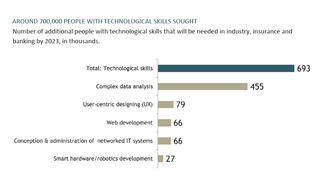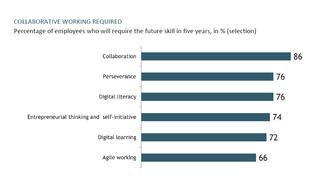
Businesses face a dual challenge against the backdrop of advancing digitization and the development of new forms of work.
On the one hand, they must resolve the problem of the already scarce number of experts with technological skills — that classic industrial companies and service providers continue to find so difficult to recruit. On the other hand, it is essential that the majority of the remaining workforce be given the new digital and non-digital qualifications they need in Workforce 4.0. Developing a better understanding of which future skills will be needed in future and to what extent is not just important as a planning and decision basis for companies, but also for politicians and education institutions.
The following section will first estimate the future demand for technological specialists before more closely examining further training needs at the level of digital and non-digital key qualifications. In both instances, the quantification is based on the online survey of 607 companies in industry, insurance and banking.
CEO, start-up
By 2023, around 700,000 additional tech specialists will be needed
In the area of technological skills, the survey reveals around 700,000 people with the appropriate capabilities will be needed by 2023 in business alone. This demand is based on the difference between the number of employees who currently possess individual technological skills and the number that the survey suggests should possess these skills in five years.
When this figure of 700,000 people is broken down according to the underlying future skills, the demand for people with the ability to perform complex data analyses is shown to be 455,000 people, which is by far the biggest share, and accounts for over half the total demand for technological skills. This high figure indicates that businesses will gather and process large data volumes even more intensively than before and that artificial intelligence based on complex data analysis will play an ever greater role.
The area of complex data analysis also has the greatest impact on job profiles outside IT departments, influencing almost all areas of companies — from Research and Development, Sales and Marketing, to HR and Organization. And yet it is not just in different functional areas that more experts with complex data analysis skills will be needed in future: Owing to the increased data collection possibilities that digitization brings, new business models will emerge beyond the traditionally data-intensive industries like insurance that will be based on the analysis and interpretation of large data volumes. Expertise in complex data analysis will therefore become a central interface competence in companies across industries and functional areas.
Survey methodology and extrapolation of the Future Skills demand
In June 2018, 607 companies comprising large corporations, start-ups, and small to medium-sized enterprises were surveyed online and asked to what extent employees possess or will need to possess any of the above-mentioned future skills. The extrapolation is based on the assessments of these companies.
The additional demand for technological skills is calculated as the difference between workers in industry, insurance and banking with a high level of education (in accordance with the International Standard Classification of Education (ISCED) of UNESCO, Levels 5 and 6) who currently possess the individual skills, and the number that businesses believe should possess these skills in five years. For example, in the area of complex data analysis, the survey shows that 455,000 more specialists will be needed in five years than currently work in this area. The rounded figure of 455,000 is calculated as a percentage difference (percentage of all employees that will require these skills in five years minus the percentage that already possess these skills), multiplied by the total number of workers in industry, insurance and banking with a high level of education.
At 27,000, demand in the area of smart hardware/robotics development is estimated to be significantly less. One possible explanation for this may be the fact that the required skills are relatively similar to the key skills previously needed in engineering, which means there is already a large pool of suitably trained workers. Due to the ongoing and central importance that software plays in business models, these results could also be interpreted as evidence of businesses possibly focusing on the area of software or simply underestimating the importance of hardware and robotics.
In terms of blockchain technology, it was not possible in many cases to put a figure on demand, and this has therefore not been included in the calculation. However, it is clear that demand in this technology is developing very dynamically, as evidenced for example by analyses of the online job site Indeed, measured in visitor numbers to one of the biggest job portals in Germany and worldwide. From January to December 2017 alone, the number of advertised positions that contained a reference to blockchain rose by 625%, while search queries that included the term blockchain rose by 661% over the same period. Although this huge rise is still based on low absolute figures, the example shows how quickly new technologies can impact demand for certain qualifications in the labor market.
Therefore, assuming a demand of 700,000 people, in the next five years around 140,000 people each year on average would have to acquire advanced technological skills — solely for the area of the economy analyzed in this paper, which is equivalent to around 60% of workers in Germany. If these results are also applied to the public sector, the demand for people with technological skills rises to around 1.1 million – an immense training challenge.
According to businesses, this demand can be covered in different ways: First, through targeted recruitment of graduates from the relevant disciplines. Second, the existing workforce can be helped to build these skills through appropriate further training, for example providing machine engineers with further training in smart hardware and robotics. Third, technological skills can also be passed on more as part of dual training, for example in web development or UX design. Fourth, German companies are increasingly active in the global labor market, and can recruit tech specialists worldwide. Some businesses also indicate that they may base their technology activities in countries in which technology specialists are available in sufficient numbers. Discussion papers 2 and 3 of this series will analyze the challenges facing HR departments and education institutions.
Key digital and non-digital qualifications: One in four workers require further training
Various skills and abilities will become key qualifications for all types of role in Workplace 4.0 from Sales Manager to Administrative Assistant — for example, routine handling of electronic data, basic understanding of data privacy, collaboration with others, continuous learning, and largely independent working. This finding was confirmed by the HR officers surveyed, who unanimously agree that the greatest demand for further training in the coming years will be in the area of key digital and non-digital skills.
CEO, start-up
The future skill needed by most employees is the ability to collaborate, which is increasingly being supported and shaped by digital technologies. Nine in every ten employees will need to master this skill. Around three-quarters of employees require basic digital knowledge and should show perseverance and self-initiative. Although demand for people who have mastered agile working is the lowest, two-thirds of workers should still possess this skill.
Comparing the number of people who already have the individual skills and the number that businesses believe will need these skills in five years reveals a large training gap. The greatest demand is in digital learning: To ensure that around three-quarters of employees have digital learning skills in five years, some 3.8 million must receive further training by that time. Digital literacy skills must be reinforced for 2.8 million people over this period, and further training requirements are equally high in the areas of collaboration and digital interaction. The lowest, still significant, demand is in the area of entrepreneurial thinking, where around 2.4 million people require further training.
Although these figures may seem high due to the radical nature and speed with which digitization and automation are changing the workplace, they are not unrealistic. The importance of further training has continued to increase in recent years, and the pool of people participating in further training has constantly expanded. In 2016, for example, one in two adults aged between 18 and 64 took part in some sort of further training. So although it appears ambitious to meet the demand, it is not impossible.
The skills gap in cross-disciplinary qualifications can only be closed if people continue to receive targeted further training at work. One-off “training courses” are not enough; instead systematic and continuous further training and upskilling in the workplace is necessary as part of lifelong learning.
Further info
This Future Skills Framework which covers the current competences required by business and society was developed by Stifterverband and McKinsey in the summer of 2018 in co-operation with companies. For further details see the dissussion paper "Future Skills: Which skills are lacking in Germany" published in September 2018.


